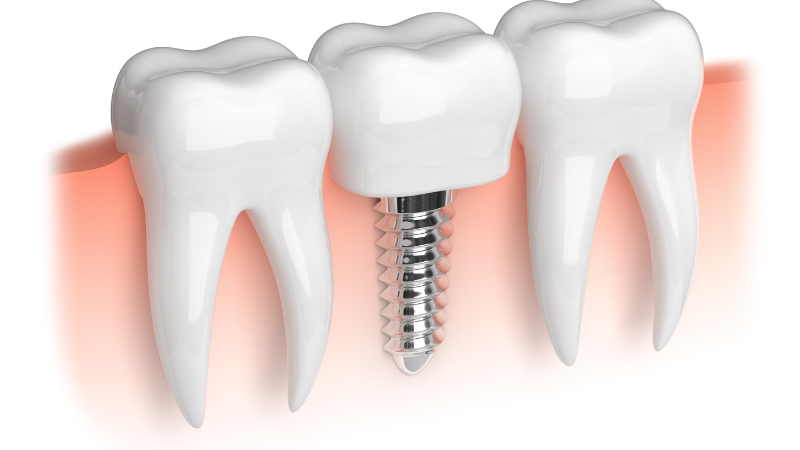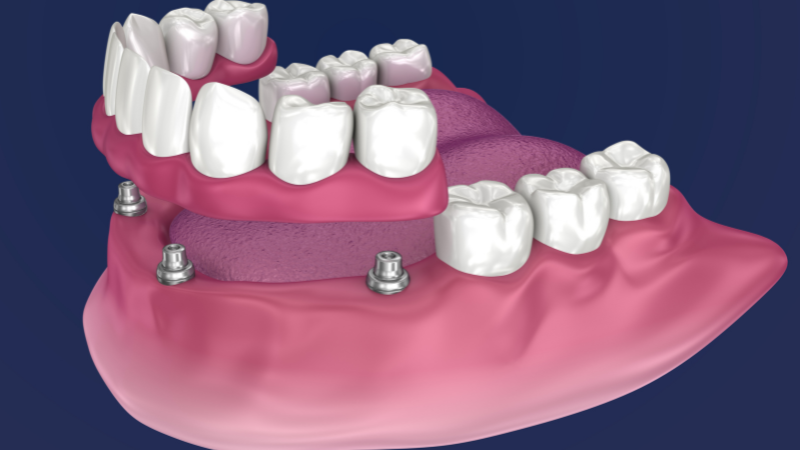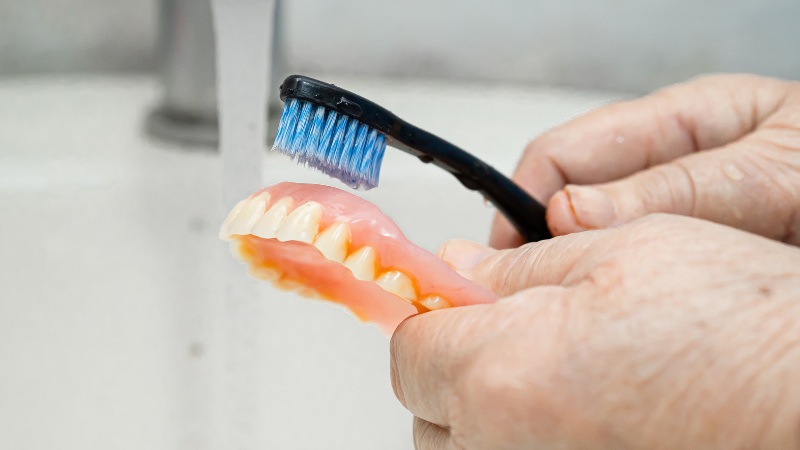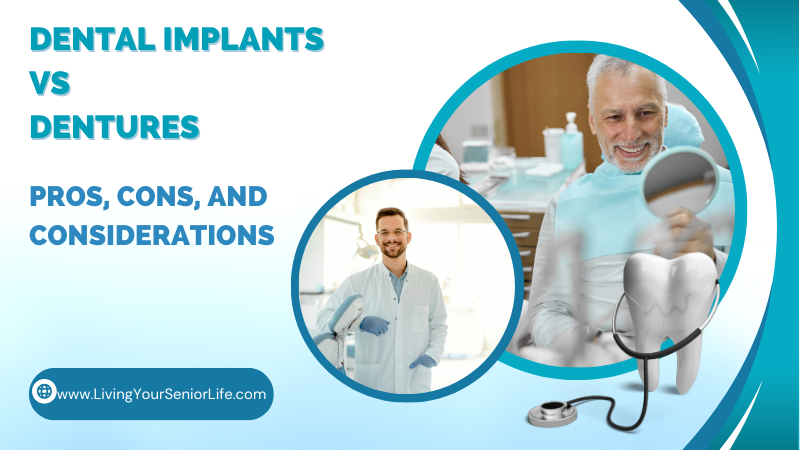When it comes to restoring a confident smile and optimal oral function, dental implants and dentures emerge as two primary options, each with its own set of advantages and drawbacks. For individuals navigating the landscape of tooth replacement, understanding the nuances of dental implants vs dentures is essential for making informed decisions regarding their oral health and quality of life.
In this comprehensive guide, we’ll delve into the world of dental implants and dentures, exploring the pros, cons, and critical considerations associated with each. By shedding light on the distinctive features, benefits, and potential limitations of these treatment modalities, we aim to empower you with the knowledge necessary to navigate your dental journey with confidence and clarity.
Key Takeaways:
- Dental implants offer a permanent solution and natural function.
- Dentures are a more affordable option but require more maintenance.
- Your specific needs and dental health are crucial in deciding the best treatment.
Choosing between dental implants and dentures can significantly impact your quality of life. If you’re dealing with missing teeth, you need to understand the benefits and limitations of each option.
Dental implants are a permanent solution, offering stability that traditional dentures can’t match. They are fixed in your jawbone, providing a natural look and function similar to your natural teeth.
Dentures, whether partial dentures or complete dentures, are popular options that fit on top of the gums. They are more affordable but might not offer the same durability and comfort as implants.
Implants require a surgical procedure but can last a long time with proper care. On the other hand, dentures need maintenance and can sometimes feel less secure or cause bone loss over time.
Considering your specific needs and circumstances is crucial.
If your jaw bone is healthy and you can undergo surgery, implants might be the better option. On the other hand, if you need a quicker, non-surgical solution, dentures might be your best bet.
Understanding the pros and cons of each option will help you make an informed decision that suits your dental health and lifestyle.
Understanding Dental Implants and Dentures
Dental implants and dentures are popular options for tooth loss. Implants are artificial tooth roots made of titanium posts. They are surgically placed into the jaw bone and provide a permanent solution for missing teeth.
Dentures are prosthetic teeth that sit on top of the gums. There are different types, including partial dentures, full dentures, and implant-supported dentures. Traditional removable dentures rest on the gum line and require denture adhesive for stability.
Pros and Cons
Dental implants have numerous advantages. They help prevent bone loss in the jaw bone and maintain the health of your jawbone and gum tissue. They also allow for natural eating and speaking without the risk of embarrassing moments.
Traditional dentures are a more affordable option. They can be made quickly and are less invasive. However, they may not be as stable as implants and can cause discomfort or gum irritation.
Suitability
Choosing between implants and dentures depends on individual needs.
Dental implants require sufficient bone density and healthy gums. If there’s not enough bone, a bone graft might be necessary.
On the other hand, dentures are suitable for people who might not be good candidates for surgery or those looking for a less costly option.
Types of Dental Implants and Dentures
Choosing between dental implants and dentures involves understanding the distinct types of each. This section breaks down the different kinds to help you make an informed decision based on your specific needs and dental health.
Types of Dental Implants

Single Tooth Implants: These are ideal for replacing a missing tooth. A titanium post is surgically inserted into the jawbone, providing a sturdy base for a dental crown. This method mimics natural teeth and maintains the health of your jawbone.
Implant-Supported Dentures: These are recommended if you need to replace multiple teeth or an entire arch. They are more stable and offer a permanent solution compared to traditional removable dentures. Overdentures, which snap onto the implants, are a popular option here.
All-on-4 Implants: This involves placing four implants into the jawbone to support a full arch of replacement teeth. It’s effective for tooth loss and is often a quicker fix, requiring fewer implants. It provides a long-lasting solution with proper care.
Mini Dental Implants: These are smaller in diameter and can be a more affordable option. They are used when there isn’t enough bone for standard implants. Mini implants also require a less invasive surgical procedure and shorter recovery time.
Types of Dentures

Complete Dentures: Used when all teeth are missing, complete dentures can be conventional or immediate. Immediate dentures are placed right after tooth extraction, while conventional ones are fitted after the gums have healed.
Partial Dentures: These are recommended if you’re missing some teeth but others remain natural. Partial dentures fill in the gaps and prevent other teeth from shifting. Removable and easy to care for, they also address bone loss concerns.
Implant-Supported Dentures: These dentures are anchored into titanium implants in your jawbone. They offer enhanced stability, allowing you to enjoy your favorite foods without the worry of embarrassing moments. This can be a great option for long-term oral health.
Permanent Dentures: Unlike traditional removable dentures, permanent dentures are fixed in place with dental implants. This option is best suited for those wanting a secure fit without using denture adhesive. They feel more like natural teeth and improve quality of life with proper maintenance.
Overdentures: Placed on top of the gums and attached to implants, overdentures are removable and require fewer implants compared to full arch replacements. This method helps preserve bone density and provides a more natural eating experience.

Immediate Dentures: These are placed immediately following tooth extraction. They provide an immediate tooth replacement option, although they may require adjustments as gums heal and shrink.
Comparing Durability and Longevity
When choosing between dental implants and dentures, understanding their durability and lifespan is crucial. Each option has unique benefits and challenges that can influence your decision based on your specific needs and preferences.
Lifespan of Dental Implants
Dental implants are often viewed as a long-lasting solution. With proper care, they can last a lifetime.
Implants are made from titanium posts, which are biocompatible and fuse with the jaw bone through a process called osseointegration. This deep integration ensures that the implant remains stable and durable, closely resembling natural teeth.
One of the primary benefits of dental implants is their resistance to decay and gum disease, although maintaining good oral hygiene is still necessary.
Implements can support replacement teeth such as crowns or implant-supported dentures, providing a permanent solution for missing teeth.
Additionally, the lifespan of implants is not affected by adjacent teeth, unlike other tooth replacement options such as dental bridges. This makes implants a better option for those who want to avoid frequent replacements and enjoy natural eating without worry.
Durability of Dentures
Traditional dentures are made from acrylic or metal and can last between 5 to 10 years.
With proper maintenance, such as regular cleaning and avoiding hard foods, they can serve you well for a significant period. However, dentures may require adjustments or replacements due to natural changes in the gum line or jaw bone.
Full dentures and partial dentures are more affordable options compared to implants, but they don’t fuse with the bone. This can lead to issues like slippage or discomfort, especially when eating your favorite foods.
Immediate dentures can provide a quick fix after tooth extraction, but traditional removable dentures may need adhesives to stay in place, which can be inconvenient. Despite these challenges, dentures are an effective solution for many, especially if you are not a good candidate for implants due to insufficient bone density or other health conditions.
People who need a short-term or more budget-friendly option may find dentures to be the right solution. Nonetheless, they do not offer the permanent stability or long-term oral health benefits associated with implants.
Regular check-ups and proper care are essential to extending the lifespan of dentures and ensuring positive results.
Aesthetic and Functional Factors
When deciding between dental implants and dentures, considering both aesthetic and functional factors is crucial. These aspects greatly impact your confidence, comfort, and overall quality of life.
Appearance and Comfort
Dental implants mimic the appearance of natural teeth closely. They blend seamlessly with your existing teeth, especially after the healing process. This makes implants a preferred choice for those concerned with missing teeth and aesthetics.
Implant-supported dentures or permanent dentures are fixed to the jaw bone, giving them stability and comfort that traditional dentures may lack. With implants, there’s no need for denture adhesive, reducing embarrassing moments.
Traditional dentures, whether partial dentures or full dentures, sit on top of the gums and can feel bulky or loose. This can sometimes affect confidence and require frequent adjustments.
Chewing and Speaking Efficiency
Dental implants and implant-supported dentures restore your ability to chew efficiently. This lets you enjoy your favorite foods without restrictions. Implants function like natural teeth, providing a more natural eating experience compared to traditional removable dentures which can shift.
Implants also support speaking clarity. They help in maintaining proper speech and prevent the mumbling that can occur with dentures. Because they are anchored in the jaw bone, implants don’t move, allowing you to speak clearly.
Conventional dentures, on the other hand, can slip and impact speech. They may also require dental adhesive to stay in place, which can be inconvenient and less effective in maintaining speech and chewing efficiency.
Surgical and Non-Surgical Procedures
Choosing between dental implants and dentures involves understanding the procedures for each. Dental implants are a surgical solution, while dentures offer a non-surgical approach.
Dental Implant Surgery Process
Dental implant surgery involves several steps and typically takes several months to complete. First, there is a consultation with your implant dentist.
During this visit, your oral health will be assessed, and x-rays will determine if you have enough bone density for the implants. If you lack sufficient bone, a bone graft might be needed.
The surgical procedure starts with placing titanium posts into your jaw bone. Once the titanium implant is in place, it needs time to heal and fuse with the bone. This process is called osseointegration, which can take a couple of months.
When the titanium posts have fused properly, a small connector called an abutment is attached to each post. Finally, a dental crown or a set of prosthetic teeth is placed on top of the abutment.
This method is a permanent solution for replacing missing teeth and offers numerous advantages such as maintaining the health of your jawbone, allowing natural eating, and improving your quality of life.
Fitting and Adjustments for Dentures
Dentures are a popular option for replacing missing teeth without surgery. This process begins with tooth extraction if necessary, followed by taking impressions of your gums and any remaining teeth.
These impressions are used to create a model for your dentures, ensuring they fit the exact shape of your mouth.
Partial dentures replace a few missing teeth and rely on remaining natural teeth for support. Full dentures, or complete dentures, replace an entire arch of teeth. Immediate dentures can be fitted right after tooth extraction, but conventional dentures require your gums to heal first.
Once your dentures are made, several fittings and adjustments may be needed to ensure comfort and functionality. Dentures might require occasional relining or rebasing as your mouth changes shape over time.
Proper care and maintenance, like using denture adhesive and cleaning them regularly, will help prevent issues like gum disease and tooth decay. Traditional removable dentures are a more affordable option compared to dental implants, but they may need replacing after a few years.
Maintenance and Daily Care
Proper maintenance and daily care are essential for both dental implants and dentures to ensure their longevity and effectiveness. Each type requires specific routines to maintain good oral hygiene and overall dental health.
Caring for Dental Implants
Dental implants require a routine similar to the care of natural teeth. Brushing and flossing twice a day is key to preventing plaque buildup around the implant.
Use a soft-bristle toothbrush and non-abrasive fluoride toothpaste to clean your implants gently. Flossing is crucial to remove food particles that could lead to gum disease.
Regular dental check-ups are important for monitoring the health of your implants. This allows your dentist to ensure that your implants are well-maintained and addressing any potential issues early on.
Good oral hygiene can help your implants last a lifetime.
Avoid using teeth-staining substances like tobacco and limit drinking substances like coffee and wine, as they can discolor both your natural teeth and your dental crowns.
Dental implant-supported dentures may also benefit from using a water flosser, which can clean hard-to-reach areas around the implants.
Denture Maintenance

Traditionally removable dentures require daily cleaning to maintain their appearance and function. At night, remove your dentures and brush them with a denture cleaner, avoiding regular toothpaste as it can be abrasive.
Soak the dentures overnight in a denture solution to keep them clean and moist.
You may need to apply denture adhesive to secure your dentures throughout the day. This prevents embarrassing moments from slipping dentures and ensures comfort.
Proper care also involves cleaning your gums and any remaining natural teeth to prevent tooth decay and gum disease.
For partial dentures, ensure that clasps and attachments are free from debris. Full dentures should also be regularly checked by your dentist for fit adjustments, as your gum tissue and bone may change over time, affecting the fit.
With proper maintenance, traditional dentures can last up to 5 to 10 years. Keeping up with these routines will improve your overall quality of life and ensure your dentures remain a practical and effective solution for tooth loss.
Cost Analysis and Insurance Considerations
When deciding between dental implants and dentures, it’s crucial to look at both the upfront and ongoing costs and how insurance might help. This will help you choose the best tooth replacement options based on your budget and individual needs.
Initial and Ongoing Costs for Implants
Dental implants involve a surgical procedure to place titanium posts into your jaw bone. This makes them a more permanent solution compared to traditional dentures.
Typically, each implant can cost between $3,000 to $4,500. These costs cover the implant, abutment, and dental crown. Because of the surgical nature of implants, additional costs like bone grafts and the healing process can further increase the expense.
Implant-supported dentures and a full set of teeth using All-on-4 implants can be even more costly. This treatment offers numerous advantages, including better stability and long-term oral health, but the initial investment is significant.
Implants may be the right solution if you value a natural eating experience and permanent prosthetic teeth that mimic natural teeth in both look and function.
Denture Costs and Insurance Coverage
Different types of dentures, such as conventional dentures and immediate dentures, have varying costs. For instance, partial dentures can cost between $500 and $1,500 for one arch, while full dentures range from $1,000 to $3,000. Dentures made from higher quality materials can be more expensive, costing $2,000 to $4,000 per plate. Proper care and maintenance are essential, adding to the overall cost.
Insurance coverage for dentures may be more comprehensive compared to implants. Many dental insurance plans cover a significant portion of the cost of dentures, but fewer plans cover dental implants. Check with your insurance provider to see what is included.
Denture adhesives and other supplies also factor into ongoing expenses, making dentures a more affordable option upfront but potentially more costly over time due to regular replacements and adjustments.
Potential Risks and Complications
When considering dental implants and dentures, it is important to be aware of the potential risks and complications that can arise. These can affect your health and the success of the treatment.
Risks of Dental Implant Surgery

Surgery for dental implants comes with several risks. One major risk is sinus damage, especially if you need implants in the upper jaw. The sinus is located just above the upper jaw and implant placement can sometimes penetrate it. This can lead to sinus infections and other complications.
There is also the risk of bone loss. Without enough bone to secure the implant, a bone graft might be necessary. This will prolong the healing process and increase the overall treatment time.
Additionally, dental implants require sufficient bone density for support. If you have gum disease or other health conditions, it may affect the success rate of the implant. Proper care and maintaining good oral hygiene are crucial to prevent infections or failure of the titanium posts.
Risks of Using Dentures
Using dentures has its types of risks and complications. One common issue is the potential for gum irritation. Traditional removable dentures can rub against your gums, causing sores and discomfort.
Denture adhesive is sometimes needed to keep them in place, which can be inconvenient.
Another risk is bone loss. Unlike dental implants that integrate with the jawbone, dentures sit on top of the gums and do not stimulate the bone. This can lead to further bone loss over time.
Partial dentures can also put extra pressure on the natural teeth they clip onto, potentially damaging them. Traditional dentures may also affect your ability to enjoy your favorite foods and impact your speech, leading to embarrassing moments.
Impact on Oral and Overall Health
Dental implants and dentures not only address tooth loss but also have profound effects on your oral health, bone density, and long-term well-being. Understanding how each option interacts with your mouth and overall health is vital.
Effects of Dental Implants on Oral Health
Dental implants act as artificial tooth roots, providing a foundation for replacement teeth. They integrate into your jawbone, preventing bone loss. This stimulation maintains bone density and the health of your jawbone. The titanium posts used in dental implant surgery ensure a permanent solution to missing teeth.
Implants require good oral hygiene and healthy gums for successful integration. If you maintain proper care, including regular dental check-ups, implants can last a long time with minimal maintenance.
This option feels more natural and allows for eating your favorite foods without restrictions. However, the surgical procedure does come with a longer recovery time compared to other tooth replacement options.
How Dentures Affect Oral Health
Dentures, including partial and full dentures, are a popular option for replacing multiple missing teeth. Traditional removable dentures rest on the top of your gums and can be removed daily.
They might require denture adhesive for better stability, which can sometimes cause discomfort at the gum line. While they are more affordable compared to implants, dentures have some drawbacks regarding bone health and proper maintenance.
Wearing traditional dentures might lead to bone loss over time since they do not stimulate the jawbone like implants do. This can affect the fit of your dentures, reducing comfort and functionality.
Dentures need regular adjustments and proper care to avoid gum disease and tooth decay. Immediate dentures after tooth extraction can provide a quick solution, but consider your specific needs and personal preferences when choosing the right solution for you. Implant-supported dentures offer a middle ground by combining the benefits of implants and dentures, ensuring better bone health and stability over conventional dentures.
Personal Considerations and Decision Making
When deciding between dental implants and dentures, you should consider your individual needs, preferences, and health conditions. Your choice can affect your quality of life, so it’s essential to evaluate all factors carefully.
Evaluating Candidate Suitability for Implants
First, check if you’re a good candidate for dental implants. Dental implants require sufficient bone density in the jaw to support the titanium posts. If you have bone loss, a bone graft may be needed. This will extend the treatment time.
Healthy gums are crucial for successful implantation. If you have gum disease, your implant dentist might recommend treating it first.
Dental implants are often a good solution for those missing a single tooth or an entire arch of teeth. This permanent solution can look and feel like natural teeth, allowing you to enjoy your favorite foods without worry.
The dental implant procedure involves a surgical process. This means a longer recovery time compared to dentures. However, with proper care, implants have a high success rate and can last for many years, sometimes a lifetime.
Choosing the Right Type of Dentures
Dentures come in various types, such as partial dentures, full dentures, and implant-supported dentures.
Traditional removable dentures are often a more affordable option but may require denture adhesive for stability.
Full dentures are suitable if you’ve lost all your teeth. These prosthetic teeth sit on top of your gums and can be removed for cleaning.
Partial dentures, on the other hand, replace only a few missing teeth and are held in place with clasps around your natural teeth.
Implant-supported dentures offer a more secure fit and better chewing efficiency. They use artificial tooth roots embedded in the jaw bone, making them a more stable and effective solution for some. Immediate dentures can be placed right after tooth extraction, preventing you from having to wait for new dentures.
Different types of dentures have their pros and cons. It’s important to discuss all options with your dentist to choose what best suits your specific needs and budget.
Proper maintenance and good oral hygiene can help ensure long-term oral health, regardless of the type of denture you choose.
Advancements and Future of Tooth Replacement Options
Recent advancements in tooth replacement options focus on improving durability, aesthetics, and comfort for patients. Innovations in dental implants and evolving denture designs play significant roles in providing better solutions for missing teeth.
Innovations in Dental Implant Technology
Dental implants have seen remarkable improvements in the last few years. The use of titanium posts has become more widespread because they integrate well with the jaw bone, acting as artificial tooth roots. This significantly reduces the risk of bone loss and gum disease.
New techniques, such as bone graft and sufficient bone density evaluations, make dental implant surgery suitable even for those with lower bone mass.
Implant-supported dentures are another advancement. They combine the stability of implants with the affordability of dentures, offering a more permanent solution.
Immediate dentures are another advancement, allowing you to get replacement teeth immediately after tooth extraction.
Evolution of Denture Fabrication and Design
Traditional removable dentures are being replaced by more advanced types of dentures that cater to individual needs.
For instance, implant-supported dentures offer more stability, reducing the need for denture adhesive and preventing embarrassing moments. These dentures attach directly to titanium implants placed in the jaw, providing a more natural eating experience.
Partial dentures and full dentures are now made using high-quality materials that closely resemble natural teeth and gum tissue, enhancing both appearance and function.
Permanent dentures are another option, providing long-term solutions without the need for frequent replacements.
Advances in fabrication technology also allow for customizable designs tailored to your specific needs, improving comfort and fit.
Final Thoughts
As we conclude our exploration of dental implants versus dentures, it’s evident that both options offer valuable solutions for individuals seeking to restore their smiles and oral function. While dental implants boast unparalleled stability, longevity, and natural aesthetics, dentures provide a non-invasive, cost-effective alternative suitable for various needs and preferences.
Ultimately, the choice between dental implants and dentures hinges on a multitude of factors, including oral health status, bone density, budget, lifestyle considerations, and personal preferences. By consulting with a qualified dental professional and weighing these factors thoughtfully, you can embark on a path towards optimal oral health and renewed confidence.
Whether you opt for the permanence of dental implants or the versatility of dentures, one thing remains certain – prioritizing your oral health and seeking professional guidance are paramount. With the right support and information at your disposal, you can embark on a journey towards a vibrant, healthy smile that stands the test of time.






